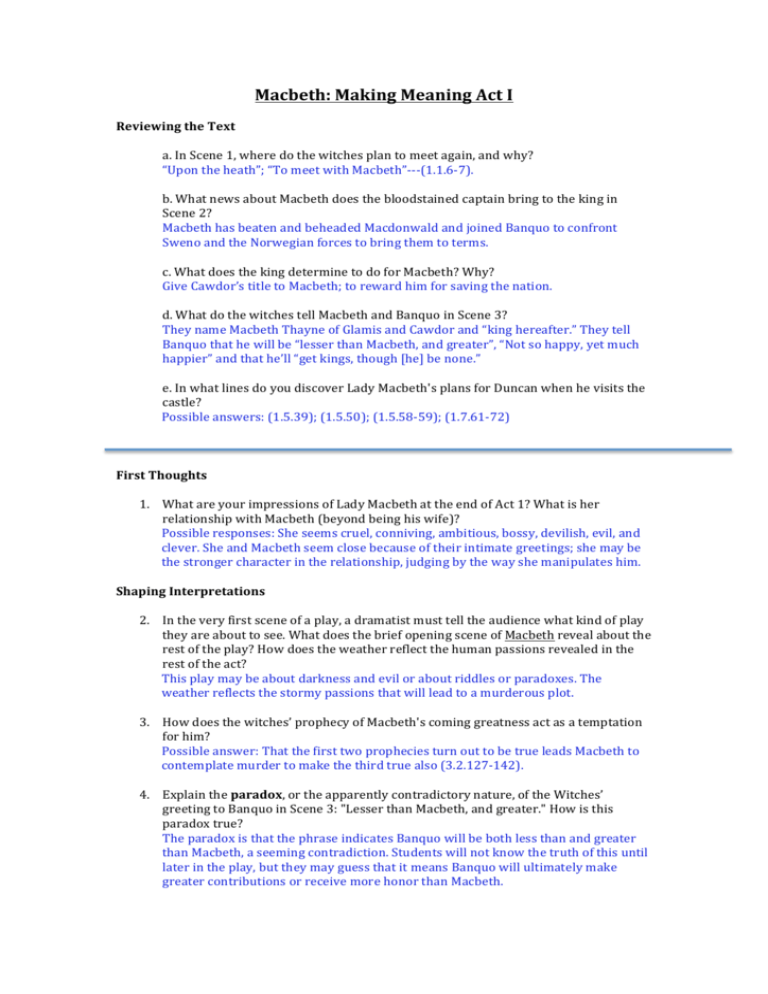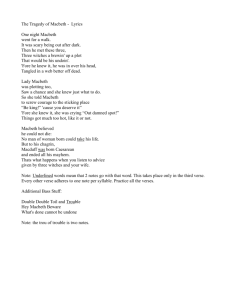Macbeth: Making Meaning Act I
advertisement

Macbeth: Making Meaning Act I Reviewing the Text a. In Scene 1, where do the witches plan to meet again, and why? “Upon the heath”; “To meet with Macbeth”-­‐-­‐-­‐(1.1.6-­‐7). b. What news about Macbeth does the bloodstained captain bring to the king in Scene 2? Macbeth has beaten and beheaded Macdonwald and joined Banquo to confront Sweno and the Norwegian forces to bring them to terms. c. What does the king determine to do for Macbeth? Why? Give Cawdor’s title to Macbeth; to reward him for saving the nation. d. What do the witches tell Macbeth and Banquo in Scene 3? They name Macbeth Thayne of Glamis and Cawdor and “king hereafter.” They tell Banquo that he will be “lesser than Macbeth, and greater”, “Not so happy, yet much happier” and that he’ll “get kings, though [he] be none.” e. In what lines do you discover Lady Macbeth's plans for Duncan when he visits the castle? Possible answers: (1.5.39); (1.5.50); (1.5.58-­‐59); (1.7.61-­‐72) First Thoughts 1. What are your impressions of Lady Macbeth at the end of Act 1? What is her relationship with Macbeth (beyond being his wife)? Possible responses: She seems cruel, conniving, ambitious, bossy, devilish, evil, and clever. She and Macbeth seem close because of their intimate greetings; she may be the stronger character in the relationship, judging by the way she manipulates him. Shaping Interpretations 2. In the very first scene of a play, a dramatist must tell the audience what kind of play they are about to see. What does the brief opening scene of Macbeth reveal about the rest of the play? How does the weather reflect the human passions revealed in the rest of the act? This play may be about darkness and evil or about riddles or paradoxes. The weather reflects the stormy passions that will lead to a murderous plot. 3. How does the witches’ prophecy of Macbeth's coming greatness act as a temptation for him? Possible answer: That the first two prophecies turn out to be true leads Macbeth to contemplate murder to make the third true also (3.2.127-­‐142). 4. Explain the paradox, or the apparently contradictory nature, of the Witches’ greeting to Banquo in Scene 3: "Lesser than Macbeth, and greater." How is this paradox true? The paradox is that the phrase indicates Banquo will be both less than and greater than Macbeth, a seeming contradiction. Students will not know the truth of this until later in the play, but they may guess that it means Banquo will ultimately make greater contributions or receive more honor than Macbeth. 5. How does Banquo's reaction to the Witches differ from Macbeth's? What do you think Macbeth's reaction suggests about his character? While Macbeth “Start[s], and seem[s] to fear,” Banquo maintains his poise, neither begging nor fearing. Banquo wonders at their vanishing and is skeptical, but Macbeth longs for them to have stayed and commands them to speak. Macbeth seems superstitious and gullible. 6. One of the most interesting parts of any serious play is what goes on in the characters' minds. What conflict rages in Macbeth after he hears the witches' prophecy? What resolution to this conflict does Macbeth express in his aside, in Scene 4, lines 48-­‐53? He weighs his aversion to murdering Duncan against his desire to be king; he wonders whether to see what happens or make the third prophecy come true. When Duncan makes Malcolm his heir, Duncan directly blocks Macbeth’s path to the throne, which tips the balance in favor to violence. 7. Describe the temperamental differences between Macbeth and his wife. Who is more single-­‐minded and logical? Who is more argumentative and sensitive? Which one wins the argument? Possible answers: Lady Macbeth-­‐ practical, single-­‐minded, logical, strong. Macbeth-­‐ open to persuasion, poetic, sensitive, insecure when not in battle, argumentative, easily impressed. Lady Macbeth wins, Macbeth is persuaded. 8. What irony would the audience feel as they watch Duncan enter the castle and hear him praise its peacefulness? Dramatic irony: He praises the place where, if his hosts had their way, he will be murdered. Extending the Text 9. One critic has said that the witches are “in some sense representatives of potentialities within” Macbeth. How could that statement be explained? Is there any evidence that Macbeth wanted to be king before? Explain your answer. (Synthesis) It could be explained if Macbeth in fact has already wanted or plotted to become king. Possible evidence: Scene 3, 1. 51-­‐ A guilty conscience might be why he starts. Scene 3, 2. 134-­‐137-­‐ he immediately thinks of murder (although the witches said nothing of it and he did not murder to get the first two titles), perhaps because he has already considered murder.







